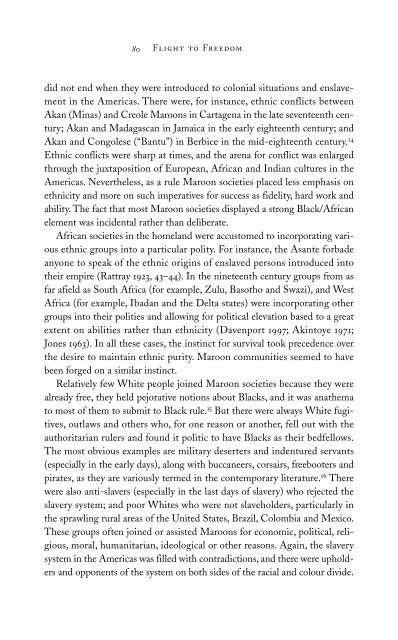60199616-flight-to-freedom-african-runaways-and-maroons-in-the-americas
60199616-flight-to-freedom-african-runaways-and-maroons-in-the-americas
60199616-flight-to-freedom-african-runaways-and-maroons-in-the-americas
Create successful ePaper yourself
Turn your PDF publications into a flip-book with our unique Google optimized e-Paper software.
80 Flight <strong>to</strong> Freedom<br />
did not end when <strong>the</strong>y were <strong>in</strong>troduced <strong>to</strong> colonial situations <strong>and</strong> enslavement<br />
<strong>in</strong> <strong>the</strong> Americas. There were, for <strong>in</strong>stance, ethnic conflicts between<br />
Akan (M<strong>in</strong>as) <strong>and</strong> Creole Maroons <strong>in</strong> Cartagena <strong>in</strong> <strong>the</strong> late seventeenth century;<br />
Akan <strong>and</strong> Madagascan <strong>in</strong> Jamaica <strong>in</strong> <strong>the</strong> early eighteenth century; <strong>and</strong><br />
Akan <strong>and</strong> Congolese (“Bantu”) <strong>in</strong> Berbice <strong>in</strong> <strong>the</strong> mid-eighteenth century. 14<br />
Ethnic conflicts were sharp at times, <strong>and</strong> <strong>the</strong> arena for conflict was enlarged<br />
through <strong>the</strong> juxtaposition of European, African <strong>and</strong> Indian cultures <strong>in</strong> <strong>the</strong><br />
Americas. Never<strong>the</strong>less, as a rule Maroon societies placed less emphasis on<br />
ethnicity <strong>and</strong> more on such imperatives for success as fidelity, hard work <strong>and</strong><br />
ability. The fact that most Maroon societies displayed a strong Black/African<br />
element was <strong>in</strong>cidental ra<strong>the</strong>r than deliberate.<br />
African societies <strong>in</strong> <strong>the</strong> homel<strong>and</strong> were accus<strong>to</strong>med <strong>to</strong> <strong>in</strong>corporat<strong>in</strong>g various<br />
ethnic groups <strong>in</strong><strong>to</strong> a particular polity. For <strong>in</strong>stance, <strong>the</strong> Asante forbade<br />
anyone <strong>to</strong> speak of <strong>the</strong> ethnic orig<strong>in</strong>s of enslaved persons <strong>in</strong>troduced <strong>in</strong><strong>to</strong><br />
<strong>the</strong>ir empire (Rattray 1923, 43–44). In <strong>the</strong> n<strong>in</strong>eteenth century groups from as<br />
far afield as South Africa (for example, Zulu, Basotho <strong>and</strong> Swazi), <strong>and</strong> West<br />
Africa (for example, Ibadan <strong>and</strong> <strong>the</strong> Delta states) were <strong>in</strong>corporat<strong>in</strong>g o<strong>the</strong>r<br />
groups <strong>in</strong><strong>to</strong> <strong>the</strong>ir polities <strong>and</strong> allow<strong>in</strong>g for political elevation based <strong>to</strong> a great<br />
extent on abilities ra<strong>the</strong>r than ethnicity (Davenport 1997; Ak<strong>in</strong><strong>to</strong>ye 1971;<br />
Jones 1963). In all <strong>the</strong>se cases, <strong>the</strong> <strong>in</strong>st<strong>in</strong>ct for survival <strong>to</strong>ok precedence over<br />
<strong>the</strong> desire <strong>to</strong> ma<strong>in</strong>ta<strong>in</strong> ethnic purity. Maroon communities seemed <strong>to</strong> have<br />
been forged on a similar <strong>in</strong>st<strong>in</strong>ct.<br />
Relatively few White people jo<strong>in</strong>ed Maroon societies because <strong>the</strong>y were<br />
already free, <strong>the</strong>y held pejorative notions about Blacks, <strong>and</strong> it was ana<strong>the</strong>ma<br />
<strong>to</strong> most of <strong>the</strong>m <strong>to</strong> submit <strong>to</strong> Black rule. 15 But <strong>the</strong>re were always White fugitives,<br />
outlaws <strong>and</strong> o<strong>the</strong>rs who, for one reason or ano<strong>the</strong>r, fell out with <strong>the</strong><br />
authoritarian rulers <strong>and</strong> found it politic <strong>to</strong> have Blacks as <strong>the</strong>ir bedfellows.<br />
The most obvious examples are military deserters <strong>and</strong> <strong>in</strong>dentured servants<br />
(especially <strong>in</strong> <strong>the</strong> early days), along with buccaneers, corsairs, freebooters <strong>and</strong><br />
pirates, as <strong>the</strong>y are variously termed <strong>in</strong> <strong>the</strong> contemporary literature. 16 There<br />
were also anti-slavers (especially <strong>in</strong> <strong>the</strong> last days of slavery) who rejected <strong>the</strong><br />
slavery system; <strong>and</strong> poor Whites who were not slaveholders, particularly <strong>in</strong><br />
<strong>the</strong> sprawl<strong>in</strong>g rural areas of <strong>the</strong> United States, Brazil, Colombia <strong>and</strong> Mexico.<br />
These groups often jo<strong>in</strong>ed or assisted Maroons for economic, political, religious,<br />
moral, humanitarian, ideological or o<strong>the</strong>r reasons. Aga<strong>in</strong>, <strong>the</strong> slavery<br />
system <strong>in</strong> <strong>the</strong> Americas was filled with contradictions, <strong>and</strong> <strong>the</strong>re were upholders<br />
<strong>and</strong> opponents of <strong>the</strong> system on both sides of <strong>the</strong> racial <strong>and</strong> colour divide.


